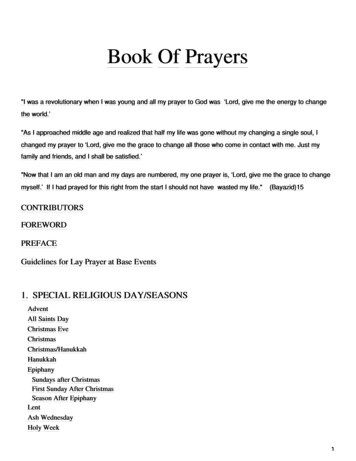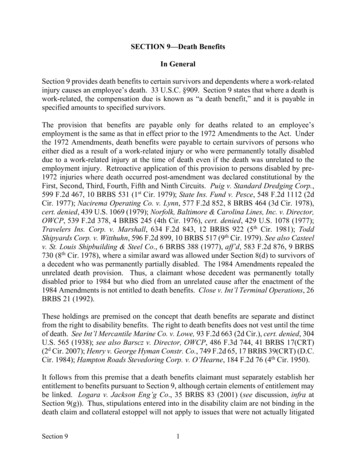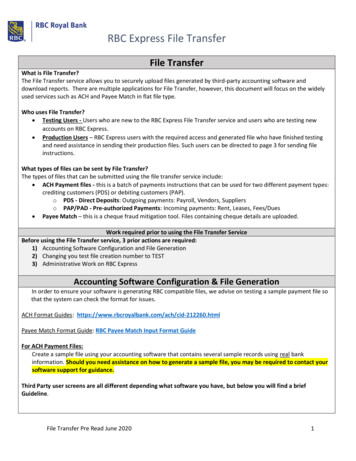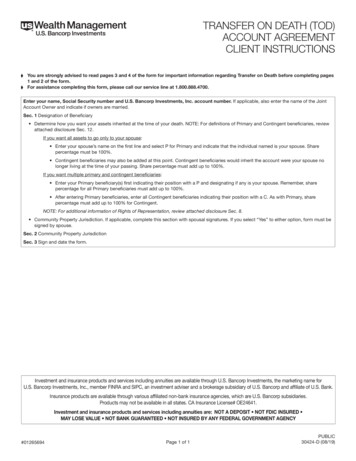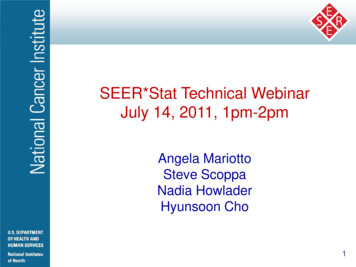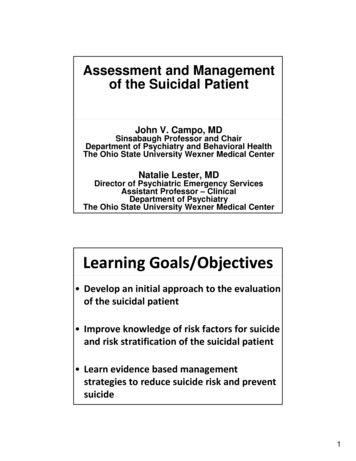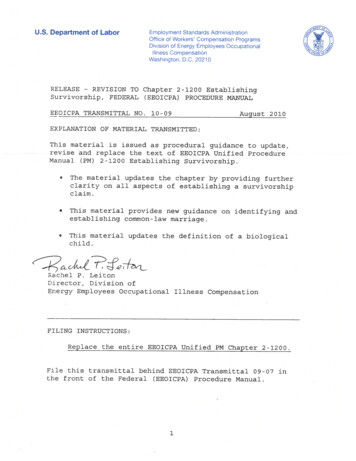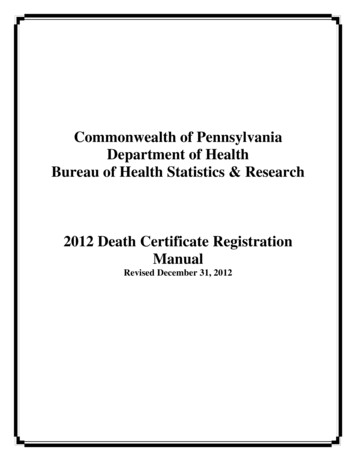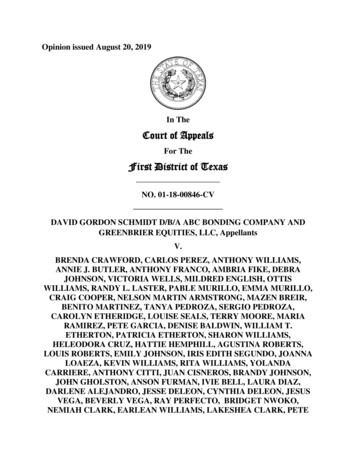
Transcription
TRANSFER ON DEATH DEEDSWashington Land Title Association Education SeminarSeptember 20, 2014Presented by: John Martin
WHAT IS A TODD?
WHAT IS “TODD”? The owner records a Deed that states it is to become effectiveat his/her death. When that occurs, the grantee becomes thelegal owner automatically. The TODD is an alternative to expensive estate planning forsimple estates. The TODD allows owners to retain control of their property Codified in RCW 64.80
HOW DID THE “TODD” COME ABOUT? Raging demand from probate or real property lawyers? The WLTA called for TODD? Consumer groups clamored for TODD?
Uniform Commercial Code Probate Code Partnership Code 23 State have enacted TODD legislation, each with ownvariations Other area states with TODD legislation: Oregon, Montana,Alaska
WHEN DOES ACT APPLY Bill’s effective date was June 12, 2014 A TODD effectively transfers property to the designatedbeneficiary if it was recorded and the Transferor dies on or afterJune 12, 2014. Thus, you could have created the deed before the effective dateof the act as long as the death is on or after the act
TERMINOLOGY Beneficiary – person that receives property under a transfer ofdeath deed Designated Beneficiary – person designated to receive propertyunder a transfer of death deed Person – Individual, Corporation, Trust, Joint Venture, LLC,Public Corporation Transferor - Individual who make the Transfer
WILL THE LPO BOARD FORMULATE A FORMTRANSFER ON DEATH DEED?IF NOT, MAY AN LPO PREPARE A TODD?
To: Limited Practice OfficersFrom: Washington State Limited Practice BoardOn June 12, 2014, the Washington Uniform Real Property Transfer On Death Act (HB 1117, 2nd EngrossedSubstitute) was enacted making it possible for a person to transfer real property through the use of a deed takingeffect at the transferor’s death (a “TOD deed”). The Act provides that for an otherwise legally effective deed totransfer property on a transferor’s death the deed simply needs to state that “the transfer to the designatedbeneficiary is to occur at the transferor’s death.” LPO’s should review the Act and familiarize themselves with itsprovisions and requirements. LPOs should remember, however, that a TOD deed is an estate-planning tool thatshould only be employed by transferors after consultation with an attorney, and that LPOs are not authorized toprovide advice to transferors on the use of TOD deeds.If an LPO receives written instructions from a party or parties to a transaction indicating that they wish the LPOto prepare a TOD deed, there is nothing in APR 12 that would prevent the LPO from inserting the above-quotedlanguage, verbatim, into an LPB approved deed form. The Board considers this situation to be similar to themodifications normally needed to use an LPB deed form to establish a joint tenancy, separate estate, orundivided interests. LPOs are nevertheless advised to review the situation with their management and/or legalcounsel prior to agreeing to prepare a TOD deed.An issue has also recently arisen that raises concerns similar to those raised by the adoption of the Act. HUD (ora HUD vendor) now appears to be routinely requesting the insertion of additional language in the LPB approvedform of deed for closings involving the sale of foreclosed property. If the parties to the transaction each agree inwriting to the insertion of specific language, an LPO may insert the agreed upon language in the deed, verbatim,in accordance with the provisions of APR 12. Once again, however, the LPO is advised to seek the advice oftheir management and/or legal counsel if he or she has any questions related to the possible impact of addingthe agreed language to the deed or a possible conflict between the warranties contained in the selectedagreement deed form and the language requested to be added.Regards,Talia Clever, LPO Program and Law Clerk Program LeadWashington State Bar Association // 1325 4th Ave Ste 600, Seattle WA 98101
REQUIREMENTS OF A TODD Must contain the essential elements and formalities of aproperly recorded inter vivos deed; Must state that the transfer to the designated beneficiary is tooccur at the transferor's death; and Must be recorded in the public records in the county where theproperty is located before the transferor’s death.
REQUIREMENTS CONTINUED All the requisites of the deed, except the present intent toconvey the designated beneficiaries Property in more than one county, need to record in all counties May be executed by attorney in fact if authorized by the Powerof Attorney Mental capacity of grantor is the same for a will – mustcomprehend what is happening; nature and extent of property,natural objects of bounty, relationship of the elements
WHAT IS NOT REQUIRED Notice, delivery, or acceptance by the Designated Beneficiaryduring Transferor’s Life Consideration from the Designated Beneficiary
WHO MAY BE A TRANSFEROR OR GRANTEE Only an individual may be a transferor A corporation, business trust, estate, trust, partnership, limitedpartnership, LLC, joint venture, etc. may not be a transferor Multiple individuals may be transferors on the same deed; alljoint tenants; both spouses of community property, evendifferent estate owners, such as life and future estate together.
A TODD MAY NOT BE USED TO EFFECTUATE ADEED IN LIEU OF FORECLOSURE
DISTINGUISHING LANGUAGE OF A TODD:“The Transfer to Designated Beneficiary is to occurat the transferor’s death”
EFFECT OF A TODD DURING TRANSFEROR’SLIFE Prior to Grantor’s death, does not affect the Grantor's creditors,encumbrances, liens, deeds of trust or other title matters; The Grantor may convey the property to another, may make anychange to the title, may revoke, may replace with a differentTODD, and may encumber with a mortgage. Designated Beneficiary’s creditors cannot attach the property.
EFFECT OF A TODD DURING TRANSFEROR’SLIFE Prior to the Grantor’s death, the recording of the TODD does notgive the Grantee any rights, or any interest in the property. A judgment, a divorce, a bankruptcy, and anything else relatedto the Beneficiary, cannot affect the property while the Grantor isalive.
EFFECT OF A TODD DURING TRANSFEROR’SLIFE TODD does not affect: Interest of any owner, including the transferor, including the rightto transfer or encumber the property Right of a transferee even if they have notice of the TODD Does not affect the transferor’s or designated beneficiary’s rightto public assistance Does not create a legal or equitable interest in favor of thedesignated beneficiary
REVOCATION OF TODD A TODD may be revoked by the Transferor by: A later recorded TODD expressly revoking or inconsistentwith earlier TODD Written, recorded revocation Later, recorded inter vivos conveyance Must expressly revoke the prior TODD Must be acknowledged after the TODD, and recorded beforethe Grantor’s death in the county where the property is located. May not be revoked by will or by act
REVOCATION OF TODD A TODD joined by multiple owners may be revoked by onealone, effective only as to the revoking party, and the TODDremains effective as to the other Grantors. A TODD related to a joint tenancy, or community property, mustbe revoked by all the Grantors. During life of both CP owners, both are required to revoke. Upon death of tone spouse/partner, the survivor may revoke.
JOINT OWNERSA TODD that is signed by all tenant in common: When Grantor dies, the TODD is effective for the interest of theGrantor. Does not affect the rights of the survivor tenant(s) in common. The TODD remains in force to be operative at the death of otherGrantor tenant(s) in common. The TODD may be revoked by any surviving Grantor, affectingonly the share of the person revoking.
EFFECT OF TRANSFERS BY JOINT OWNERSA TODD that is signed by all joint tenants: When a Grantor decedent is survived by other joint tenants, theTODD is not yet effective. Take effect when last surviving joint tenant dies; Unless, surviving joint tenant(s) revoke.
EFFECT OF TRANSFERS BY JOINT OWNERSA TODD for Community Property that is only signed by onespouse/partner: When the Grantor dies while still married or a partner, the TODDtakes effect as to that person’s interest in the CommunityProperty. The TODD does not affect the interest of the survivingspouse/partner.
EFFECT OF TRANSFERS BY JOINT OWNERSA TODD for Community Property that is signed by bothspouse/partner: When one Grantor dies while still married or a partner, and theother survives, the TODD is not effective to convey any interest. When the second Grantor dies, the TODD is effective only withrespect to the Grantor’s interest at the time of death. Note, the survivor Grantor may revoke the TODD prior to death.
WHEN GRANTOR DIES Grantee must be alive for the TODD to be effective. If multiple Grantees, the share of the predeceased Granteegoes to other Grantees. At the time of the transferor’s death, title to the property istransferred automatically to the beneficiary. The Grantee takes subject to any conveyances, encumbrances,assignments, liens, or other interests in the property. The beneficiary receives only whatever interest the transferorowned at the time of death. In all ways, the TODD has no effectuntil the death of the Grantor.
WHEN GRANTOR DIES An excise affidavit is required at the death of the Grantor. No Excise tax is due at the death of the Grantor, except if theTODD was due to a contractual obligation of the descendentowed to the recipient of the property. The transfer legally occurs automatically – but a certified copy ofthe death certificate is recorded to perfect title.
WHEN GRANTOR DIES A beneficiary may disclaim the transferred interest. Then theTODD is completely ineffective. Just like after the death of a joint tenant, or a life estatebeneficiary, the DSHA liens for medical care attach after thedecedent has no real estate interest and does affect theGrantee’s title. Even if the TODD has stated warranties, there are none given.
TITLE AND ESCROW CONSIDERATIONS Transaction involving a living grantor – TODD disclosed onSchedule BII as a note or exception. Not shown on policy. Grantor has conveyed the property to third party or recordedrevocation – not necessary to disclose TODD on report. Informed that TODD Grantor is deceased, but no deathcertificate. Require certified copy of death certificate to vest inGrantee. Possible DSHA lien for medical services. Question regardingtime to assert lien. Federal and state estate tax lien Grantor’s creditors
When one Grantor dies while still married or a partner, and the other survives, the TODD is not effective to convey any interest. When the second Grantor dies, the TODD is effective only with respect to the Grantor's interest at the time of death. Note, the survivor Grantor may revoke the TODD prior to death.
